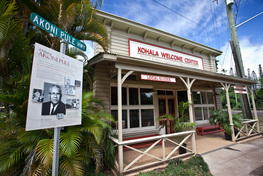 NKCRC's office and welcome center.
NKCRC's office and welcome center. The relationship between the NPOs of North Hawaiʽi and the communities they serve can be likened to that of a skilled gardener to a thriving garden. The aware gardener lets the garden speak and then responds by creating the necessary conditions for growth. This is at the heart of NPO umbrella organizations such as the Kohala Center, Friends of the Future (FOF) and North Kohala Community Resource Center (NKCRC). “We don't tell the community what it needs. The community comes to us and tells us what they think they need,” says Christina Richardson, NKCRC’s executive director.
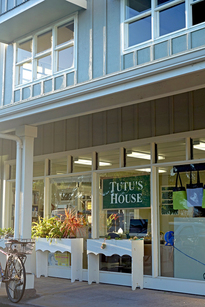 Friends of the Future is located above Tutu's House
Friends of the Future is located above Tutu's House Mainland communities with a broader tax base fill many of the needs that are answered by North Hawaiʽi NPOs. “We fulfill a lot of service roles that on the mainland or other parts of the world would be fulfilled by either municipal governments, health departments or parks and recreation. Non-profits take on a lot of functions here that would ordinarily be provided by a different structure,” says Susan Maddox, FOF’s executive director.
Primary to how NPOs of North Hawaiʽi operate is acknowledging community intelligence. The FOF began in 1991, inspired by its founder Kenneth Francis Brown, great grandson of John Papa I’i, advisor to King Kamehameha IV. For Brown, community health had a broad definition and was based in ancient Hawaiian knowledge systems and practices.
“Kenneth Brown felt that the community can best determine what they need for health and wellness. The foundation of FOF came about from a series of conversations [Brown had] over the years to see what kinds of ideas might bubble up about community health,” says Maddox.
Tutu’s House is FOF’s longest running program and has served as an educational, health and wellness resource since 1994. Other programs include the areas of cultural preservation through oral histories with Hui Kuapa; conservation and agriculture with the Waipiʽo Valley Community Circle; and education with the Hawaiʽi Island Leadership Series, Earl’s Garage and Baby Steps.
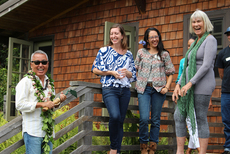 Matt Hamabata with staff members Cortney Okumura, Stella Caban and Nancy Redfeather at their new campus on Kohala Mountain. (PHOTO COURTESY OF THE KOHALA CENTER)
Matt Hamabata with staff members Cortney Okumura, Stella Caban and Nancy Redfeather at their new campus on Kohala Mountain. (PHOTO COURTESY OF THE KOHALA CENTER) The Kohala Center now has eight areas of support including educational programs such as the Malaʽai Culinary Garden and Hawaii Island School Garden Network; agriculture with the Beginning Farmer Rancher Development Program and Hawaii Public Seed Initiative; and conservation with the Kohala Watershed Partnership and the Kahaluʽu Bay Education Center.
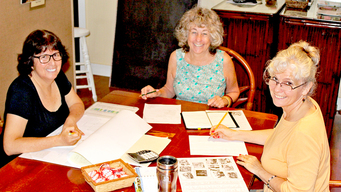 NKCRC Executive Director Christina Richardson with Office Manager Juanita Rivera and Associate Director Megan Solis. (PHOTO COURTESY OF NKCRC)
NKCRC Executive Director Christina Richardson with Office Manager Juanita Rivera and Associate Director Megan Solis. (PHOTO COURTESY OF NKCRC) Many hard working people, infused with the spirit of Aloha, have come together to create the umbrella organizations that facilitate the plethora of NPOs in North Hawaii. The North Kohala Community Resource Center was born from the vision of an umbrella organization that would serve all aspects of North Kohala community life, that Bob Martin shared with a group of concerned residents whose “hearts were in the community”. The NKCRC now has an array of programs under their umbrella that includes agriculture, conservation, education and cultural preservation.
“We have helped put music, art and yoga in the public schools. We've got some great equine programs that we do including Lio Lapaʽau and the Kohala Equine Education Center. They're all about preserving the paniolo culture, making sure the kids can learn to ride and to understand how important horses are in our history, our story,” says Richardson.
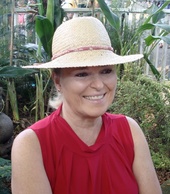 Friends of the Future’s Executive Director Susan Maddox
Friends of the Future’s Executive Director Susan Maddox But it’s not just about seeking grant monies. Beyond finding funding, it’s seeing points of connection that tap into community expertise and knowledge that make North Hawaiʽi NPOs effective beyond all expectations. “Non-profits tend to work together and network, creating something larger than any one (NPO) could individually. And in the FOF’s case, a number of programs that have come through have found interesting connections between themselves that wouldn't have necessarily happened if each of those programs were its own independent 501 c3,” Maddox says.
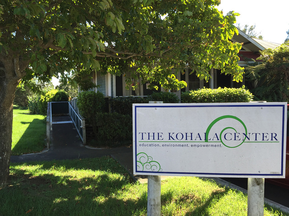
On the world stage, Kohala Center’s new Executive Director Kamana Beamer has entered the international arena. “He's just created a research agreement with the food and agriculture organization of the U.N. and has already been to Rome and Bogota,” says Hamabata.
It seems that the ancestral spirit of the land has spoken through the island communities, and the North Hawaii NPOs have listened and responded. “The Hawaiians have always thrived at the intersection of human and natural systems. So if we put those two things together, the island planet and this fantastic knowledge system about how to live well in kinship with nature, we can become a model for the world,” Hamabata concludes.
 RSS Feed
RSS Feed
